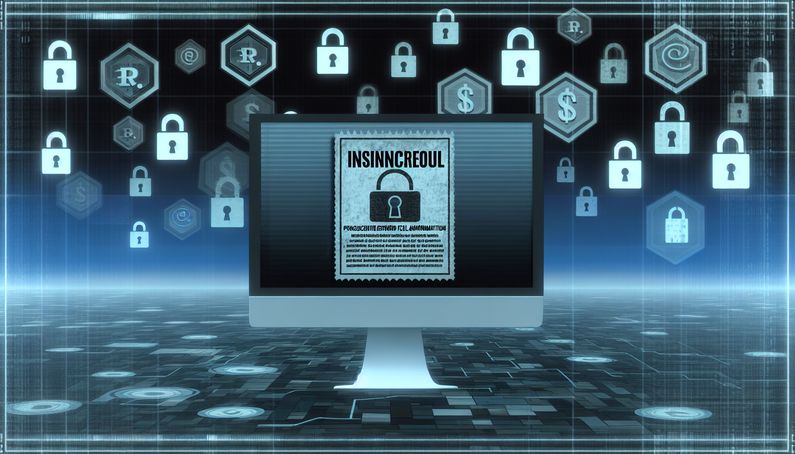
The Cybersecurity Community's Wake-Up Call: A Fake Reward and Its Lessons
A recent incident involving a fake reward announcement has highlighted significant vulnerabilities in the cybersecurity community’s information verification processes. Imagine a Telegram channel impersonating Europol, boldly claiming to offer a $50,000 reward for information on two Qilin ransomware administrators. This announcement, initially believed by many, was later debunked by Europol, revealing it as a hoax designed to troll researchers and journalists. The incident underscores the challenges faced by cybersecurity professionals in verifying information and the role of social media in spreading misinformation (BleepingComputer).
The Fake Reward Announcement
Impersonation of Europol
The fake reward announcement was initiated by a Telegram channel impersonating Europol. The channel, named @europolcti, was created on August 16, 2025, and falsely claimed to offer a $50,000 reward for information leading to the identification of two Qilin ransomware administrators, known by the aliases “Haise” and “XORacle.” The impersonation was convincing enough to gain traction among cybersecurity researchers and journalists, who initially reported it as legitimate. Europol later confirmed that the announcement was not made by them, emphasizing that the channel was a fraudulent attempt to mislead the public (BleepingComputer).
Motivation Behind the Fake Announcement
The creators of the fake announcement later admitted that the channel was created to troll researchers and journalists. The impostors aimed to expose the vulnerabilities in the verification processes of cybersecurity news outlets and researchers, who often rely on unverified sources. The fake announcement was a deliberate attempt to demonstrate how easily misinformation could spread within the cybersecurity community. A post on the imposter channel mocked those who reported on the fake reward, stating, “This was so easy to run and fool so-called ‘Researchers’ and ‘Journalists’ that just copy stuff.. Thank you all!” (BleepingComputer).
The Role of Social Media in Spreading Misinformation
Social media platforms, particularly Telegram in this case, played a significant role in the dissemination of the fake reward announcement. The rapid spread of the false information highlights the challenges faced by law enforcement and cybersecurity professionals in controlling the narrative and ensuring accurate information is communicated to the public. The incident underscores the importance of verifying sources and the potential consequences of failing to do so. The fake announcement quickly gained traction, with several cybersecurity news outlets reporting it as legitimate before Europol’s official denial (The Cyber Express).
Impact on the Cybersecurity Community
The fake reward announcement had a notable impact on the cybersecurity community. It served as a wake-up call for researchers and journalists to exercise greater diligence in verifying information before publishing. The incident also highlighted the need for improved communication channels between law enforcement agencies and the public to prevent the spread of misinformation. Europol’s swift response in debunking the fake announcement was crucial in mitigating its potential impact, but the incident still raised questions about the reliability of information in the cybersecurity field (The 420.in).
Lessons Learned and Future Precautions
The fake reward announcement serves as a case study in the importance of critical evaluation and verification of information within the cybersecurity community. Moving forward, researchers and journalists must prioritize verifying the authenticity of sources, especially when dealing with sensitive information related to cybercrime and law enforcement activities. Additionally, law enforcement agencies like Europol may need to enhance their communication strategies to quickly address and counteract misinformation. This incident underscores the need for a collaborative approach between cybersecurity professionals, journalists, and law enforcement to ensure accurate information dissemination (Dark Web Informer).
Final Thoughts
The fake reward announcement serves as a stark reminder of the importance of critical evaluation and verification in cybersecurity. It exposed the ease with which misinformation can spread and the need for improved communication between law enforcement and the public. Moving forward, a collaborative approach involving cybersecurity professionals, journalists, and law enforcement is essential to ensure accurate information dissemination and to counteract misinformation effectively (Dark Web Informer).
References
- Europol confirms that Qilin ransomware reward is fake. (2025). BleepingComputer. https://www.bleepingcomputer.com/news/security/europol-confirms-that-qilin-ransomware-reward-is-fake/
- Europol reward for Qilin ransomware group. (2025). The Cyber Express. https://thecyberexpress.com/europol-reward-qilin-ransomware-group/
- Europol reward Qilin ransomware investigation. (2025). The 420.in. https://the420.in/europol-reward-qilin-ransomware-investigation/
- Ransomware attack update for the 7th of August 2025. (2025). Dark Web Informer. https://darkwebinformer.com/ransomware-attack-update-for-the-7th-of-august-2025/



